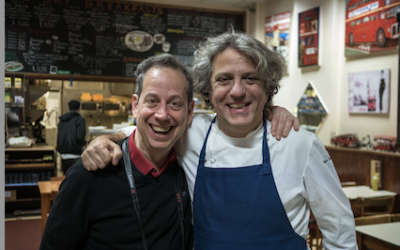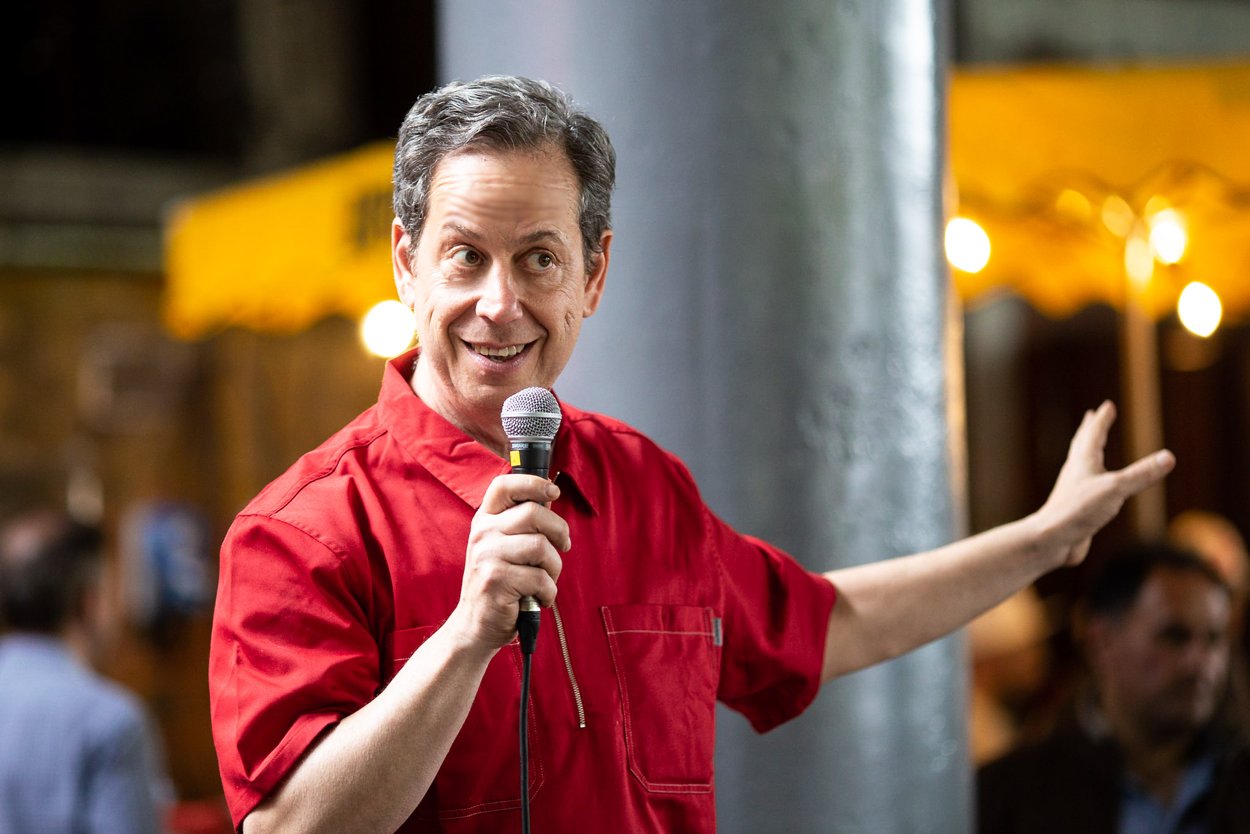 The UK had a bad night at The S. Pellegrino World’s 50 Best Restaurants 2010. In a glamorous if cacophonous countdown at Guildhall in the City of London, just 3 British restaurants heard their names called. Hibiscus (London) slipped in at 49; St John (London) got its tail in the door at 43; and 2005 winner The Fat Duck (Bray) was demoted from 2nd to 3rd best, behind El Bulli and Noma, the first-time champion from Copenhagen.
The UK had a bad night at The S. Pellegrino World’s 50 Best Restaurants 2010. In a glamorous if cacophonous countdown at Guildhall in the City of London, just 3 British restaurants heard their names called. Hibiscus (London) slipped in at 49; St John (London) got its tail in the door at 43; and 2005 winner The Fat Duck (Bray) was demoted from 2nd to 3rd best, behind El Bulli and Noma, the first-time champion from Copenhagen.
With New York placing 6 of its restaurants in the top 50 and Paris 5, proud locals who were calling London the number one restaurant city only yesterday may have been having second thoughts this morning. I too found myself reassessing my position on the matter, only from the opposite perspective: last night was the first time since moving to London 5 years ago I felt inclined to place it above Paris and New York, my prior cities of residence, as the world’s gastronomic capital.
Could this be the reversal of a starstruck food obsessive gone gooey after breathing the same heady air as celebrated chefs René Redzepi and Grant Achatz, Ferran Adrià and Heston Blumenthal? Potentially, yes. Did I maybe drink one too many mugs of smoke-breathing Guildhall Punch chilled with dry ice at the Awards after party? Not that I remember.
Mostly I was moved by the great hospitality of London, not merely to this international gathering of elite chefs but, more significantly, to their ideas, their accomplishments, their influence.
 After the awards I followed Adrià around, snapping photos and waiting for a moment alone with the master. When I got it I asked him through an interpreter what was required of the diner, what made a world’s best restaurant diner?
After the awards I followed Adrià around, snapping photos and waiting for a moment alone with the master. When I got it I asked him through an interpreter what was required of the diner, what made a world’s best restaurant diner?
“They should enjoy themselves and,” replied Adrià, pausing for emphasis, “they must be open-minded”.
That, I thought afterwards, was London: unburdened by traditions set in soil and wide open to discovery, innovation and foreign influence. In the UK, unlike in France, gastronomic chauvinism, justified or not, is rooted in the freedom to look overseas and find what’s best, a glorious task the nation’s food enthusiasts share with the organisers and judges of the 50 Best. The bias for the new over the old is manifest.
 Blumenthal denied this had been a rough night for the UK before revealing how delighted he was to see so many of his foreign chef friends, perhaps including a few selected at the expense of his overlooked British colleagues. The best thing about the awards, he said, was their expanding global reach. In his eyes the rankings, for all their subjectivity, were an accurate reflection of modern gastronomy and a new spirit of international exchange.
Blumenthal denied this had been a rough night for the UK before revealing how delighted he was to see so many of his foreign chef friends, perhaps including a few selected at the expense of his overlooked British colleagues. The best thing about the awards, he said, was their expanding global reach. In his eyes the rankings, for all their subjectivity, were an accurate reflection of modern gastronomy and a new spirit of international exchange.
“15 to 20 years ago the great chefs of France would accuse each other of stealing ideas,” said Blumental. “They were very competitive.” Now if he wants to nick an idea he calls the chef behind it on the phone, as he did with Massimiliano Alajmo, a fellow top 20 chef (from Le Calandre in Padua) also inclined to do strange things like filling a syringe with ragu. (Remember the spag bol from In Search of Perfection on the BBC?)
 End of the day, The S. Pellegrino World’s Best Restaurants 2010 is, as Achatz of Alinea, the highest-ranking US restaurant says, “a list”. What could executive chef Daniel Boulud have possibly done in the space of a year for his Daniel to climb from 41st best to 8th best restaurant in the world (apart from garnering a 3rd Michelin star)? Are there really 31 dining destinations on the planet superior to The French Laundry?
End of the day, The S. Pellegrino World’s Best Restaurants 2010 is, as Achatz of Alinea, the highest-ranking US restaurant says, “a list”. What could executive chef Daniel Boulud have possibly done in the space of a year for his Daniel to climb from 41st best to 8th best restaurant in the world (apart from garnering a 3rd Michelin star)? Are there really 31 dining destinations on the planet superior to The French Laundry?
“You can’t put too much into it,” said Achatz, as if to warn himself not to get too high – or low. “You can’t hit yourself over the head about it.”
 It was heartwarming to see Redzepi accepting his award with 7 members of his kitchen brigade, all of them wearing t-shirts bearing a photo of an 8th – Ali, a Gambian dishwasher who couldn’t get a visa and was left behind in Copenhagen.
It was heartwarming to see Redzepi accepting his award with 7 members of his kitchen brigade, all of them wearing t-shirts bearing a photo of an 8th – Ali, a Gambian dishwasher who couldn’t get a visa and was left behind in Copenhagen.
“The statement is, we miss him,” said Redzepi, “It is a team. If you surround yourself with people you love anything is possible.”
 Does this spirit of teamwork, I asked the unassuming heir to Adrià and Blumenthal, signal the downfall of the tyrant chef?
Does this spirit of teamwork, I asked the unassuming heir to Adrià and Blumenthal, signal the downfall of the tyrant chef?
“I can be angry sometimes,” he replied. “It lasts 5 minutes. Nothing is worth putting yourself through that type of crazy fighting. This isn’t the Nobel Prize.”
Still, he conceded, winning the World’s Best Restaurant prize “wasn’t all that bad”. 




You’ve captured the flavour of the evening — and I wasn’t even there. But nice to feel that I could peek over your shoulder (and love the photos — Ferran A looks like an angelic sage…!)